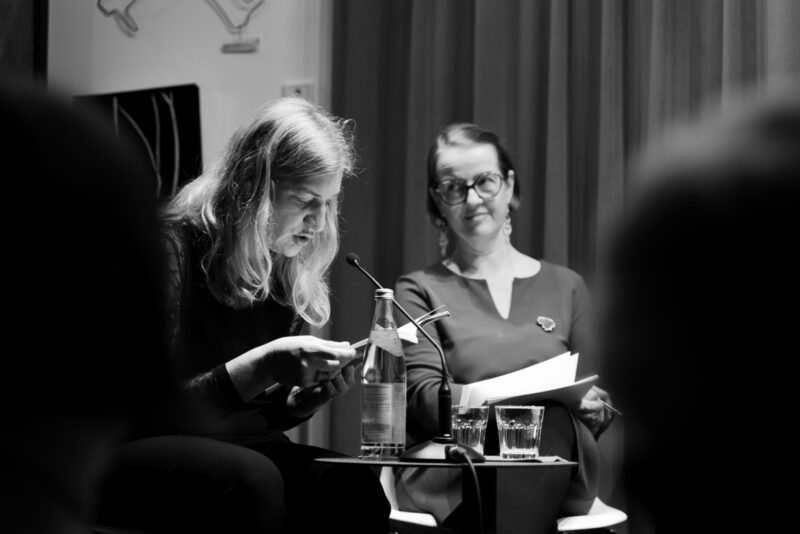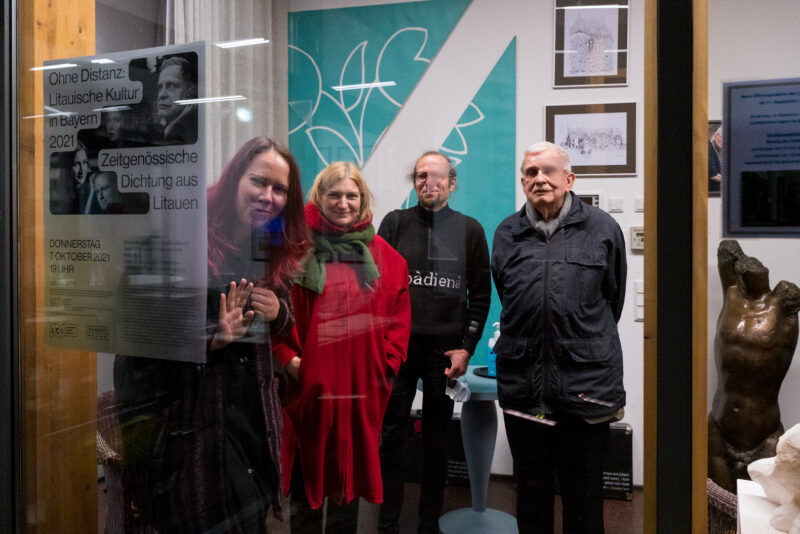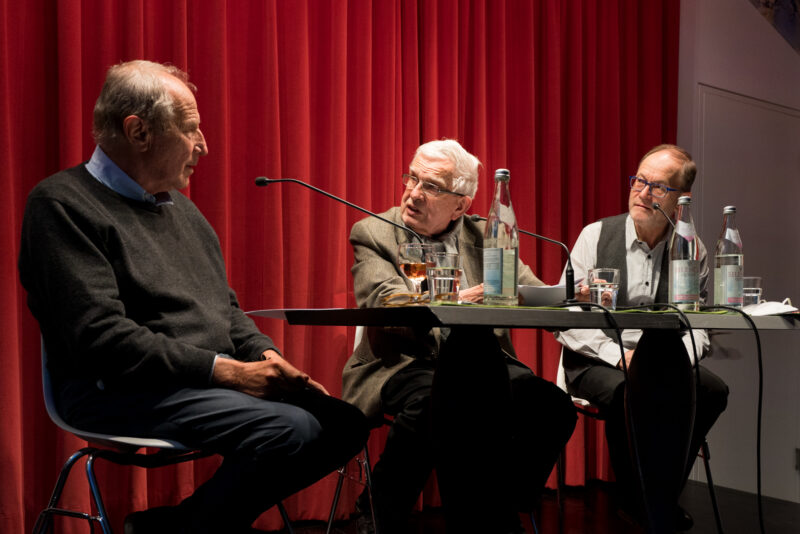GERMANY’S LARGEST POETRY LIBRARY HOSTS A LITHUANIAN POETRY EVENING

Giedrė Kazlauskaitė and Saskia Drude. Photo by Katarina Sopcic

Participants of the poetry evening. Photo by Katarina Sopcic
On 7 October, the Lyrik Kabinett in Munich, an organisation that has amassed the largest poetry collection in Germany (and the second largest in Europe!), that organises various poetry evenings and publishes both German and translated poems, hosted an evening of contemporary Lithuanian poetry with the participation of Tomas Venclova, Michael Krüger, Giedrė Kazlauskaitė, Aušra Kaziliūnaitė and Marius Burokas. The poets were presented by Rasa Balčikonytė, Lithuanian Cultural Attaché in Germany, and the event was moderated by Cornelius Hell and interpreted by Saskia Drude.
The evening of contemporary Lithuanian poetry was announced with a line from Giedrė Kazlauskaitė’s poem: “to the grey cardinal, poetry / für die graue Kardinalin, die Poesie.”
“This ‘grey cardinal’ and the Lithuanian language are what unites the guests of this evening: Tomas Venclovas, Giedrė Kazlauskaitė, Marius Burokas and Aušra Kaziliūnaitė belong to different historical and poetic epochs but what they share is that they choose poetry as a way of talking about the world”, said Dr Holger Pils, head of Lyrik Kabinett.
In the first part of the evening, three representatives of the generation of individualists, as Giedrė Kaziliūnaitė put it, not connected by any current or direction, talked to the literary translator working from Lithuanian and scholar Cornelius Hell about their work, read their poems and talked about their first poetic steps, the lyrical subject’s sexuality and “distance” from the author’s actual person and stereotypes, as well as their relationship with the present. German translations of their poems were read by translator Saskia Drude. “We, Lithuanians, are rather averse to loud slogans, urgings to defend the homeland or poetic pathos. It may be the fault of the ‘gariūnmetis‘ era[1], the Soviet ‘school’ which we still had a chance to ‘attend’, but this is what probably makes us fundamentally different from the poets of previous generations,” said Marius Burokas.

Michael Krüger, Tomas Venclova and Cornelius Hell. Photo by Katarina Sopcic
In the second part of the evening, when asked by his longtime friend Michael Krüger, a German writer, translator and publisher, about how he feels after returning to Lithuania having spent several decades living abroad, Tom Venclova shared that although he gets called Rip Van Winkle who rejoined the society after being asleep for many years, he does not necessarily feel that way and believes that he does understand modern Lithuania, at least partially: “Vilnius really has a very vibrant cultural life: great theatre, jazz, very interesting young writers, whom you, too, had a chance to meet today,” said Venclova.
Venclova’s poetry read during the evening captures a slightly different mood, though: it speaks of the language of Vilnius streets that has become harder for the lyrical subject to understand, the changed sound and new slang. The writer admitted that he is happy to still be able to cause controversy in the Lithuanian press and shared his critical view about part of the society still tending to play down the role of Lithuanians in the Holocaust, but also noted that the general situation is improving.
The poet read poems from his book of selected poems titled Variation über das Thema Erwachen (Variation on the Theme of Awakening) that is currently being prepared for the publication in Germany by Lyrik Kabinett and the publishing house Carl Hanser Verlag in Cornelius Hell’s translation, funded by the Lithuanian Cultural Institute. The book will be published in 2022.
Between readings, poetry lovers who gathered at the Lyrik Kabinett had a chance to enjoy hearing Venclova, Krüger and Hell share their comments about life and poetry, about what was written in the letter to the girl in Johannes Vermeer’s Girl Reading a Letter at an Open Window, and how many – thirty? ten? or maybe just one? – good poems it takes for a poet to be remembered for a long time.
The recording of the evening will be posted on the Lyrik Kabinett Youtube account.
[1] It is the first decade of an independent Lithuania, named after a famous marketplace near Vilnius called Gariūnai.